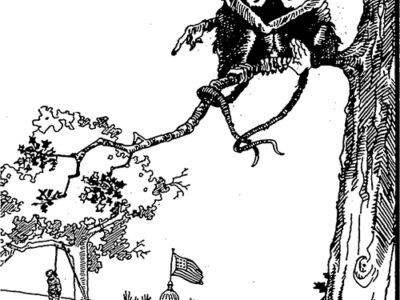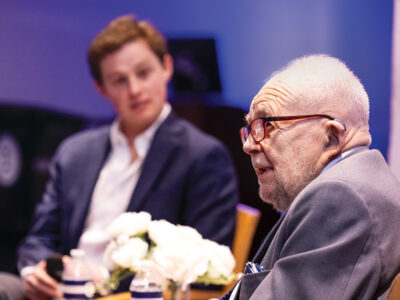
When the Women’s Army Auxiliary Corps was formed during World War II, Martha Settle Putney Gr’55 glimpsed a way out of her dead-end government job. And so she volunteered. Armed with a master’s degree from Howard University and a strong sense of self-assurance —”I told the W.A.A.C. official I would accept nothing less than a commission”—she entered elite company as one of few black women accepted into the officers-training program.
Lieutenant’s bars didn’t immunize her from racial injustice within the larger society or the menial tasks doled out disproportionately to African-American military officers. But Putney did her part—before, during and after the war—to push for equal treatment.
Putney, with Nao Takasugi WG’46 (see accompanying article), was one of dozens of Americans who told their World War II remembrances to Tom Brokaw for The Greatest Generation. That book generated so many responses that it prompted the publication of The Greatest Generation Speaks: Letters and Reflections in November. “It’s too much,” Putney says of the attention she has received since the book came out. But she patiently retells a few anecdotes about her encounters with discrimination.
At first, Putney was assigned to Fort Des Moines, where she helped train female recruits. Swimming schedules for the base pool were segregated by race, but Putney put an end to that practice. “All non-black companies could swim any day of the week except Friday; the all-black troops could swim only on Friday. And of course the pool was cleansed with chemicals afterward,” she says.
There was one racially mixed company at the base, however, made up of women who had difficulty completing basic training. Putney ordered the handful of black recruits in that company to swim with the rest of their unit. “Nobody said anything. They didn’t want to leave out the 90-something whites in that unit. As soon as other people saw what was happening, they jumped in whenever they wanted to. So it became more or less desegregated.”
Traveling from one assignment in Midland, Tex., to another assignment in the Midwest, Putney had to assert herself again. The conductor refused to honor her Army-issue Pullman ticket and sent her to the “Jim Crow coach,” directly behind the filthy coal cars. “All the coal dust in the world would come in there. I refused to stay.” After repeatedly ordering her, to no avail, to move, the conductor called the military police. “He was disturbed when all of those Army men saluted me!” Putney says, enjoying a good laugh. “He let out some four-letter words.”
The only war-era slight that still angers her was one that she was powerless to change at the time. Back in Des Moines, a group of German P.O.W.’s being held nearby were invited to the officer’s club—the same club from which black officers were barred. “They were letting the enemy in, but keeping us out.”
After the war was over, Putney’s doggedness helped her through doctoral studies at Penn, on the G.I. bill. When Putney interviewed with the late Dr. Lynn Case G’29 Gr’31, then head of the history department, she remembers him telling her, “‘We don’t give these degrees to your people.’ I just looked at him frankly and told him I didn’t want him and the University to give me one thing. If he didn’t think I could make it, let me know as soon as possible, because I didn’t have any time to waste. He said okay, and halfway through the semester, he told me, ‘You’re going to make it.’”
Putney went on to teach at Bowie State College and then Howard University, pushing her students to work up to their potential. Since retiring, she’s kept busy writing books and articles; her latest project is a history of African-Americans in the Army from the Revolutionary War through the present.
Last fall, Putney was one of four recipients of the 1999 Eleanor Roosevelet Val-Kill Medal, honoring individuals who have made contributions to society in ways that reflect Roosevelt’s ideals.
Putney attributes her lifelong perseverance to lessons in self-esteem she picked up from her parents, growing up in a family of eight children in Norristown, Pa. “I just decided I wasn’t going to accept [other people’s] classifications for me,” she says. “I knew that somebody was going to open the door for me if I kept on pushing.”




